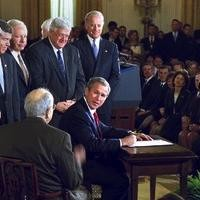When asked for his assessment of the French Revolution's historical impact, Zhou Enlai famously replied, "It is too early to tell." Historians are fond of citing the quotation, but at times ignore its fundamental insight: that they often arrive at their judgment of historical events prematurely. Nowhere does this seem truer than in the case of America's controversial intervention in Iraq.
For most historians, the narrative of the Iraq War terminates decisively with failure in 2006, even as the chronology of its costs is generously extended decades into the future (e.g., the famous $3 trillion estimate). Meanwhile, any successes -- whether the subsequent surge or the four consecutive free national elections that preceded and followed it -- are summarily discounted as meaningless, and certainly unworthy of the accumulated cost. So it's not surprising that from this perspective, no definition of "victory," or even completion, will ever be possible.
In their rush to judge, these historians represent Iraq -- in combination with Afghanistan -- as the final and decisive "quagmire" for a declining, "imperialist" America. Moreover, the war is routinely described as a significant contributing factor to the recent global financial crisis and even a decisive reason why China will soon surpass the United States as the world's primary power. The counterfactuals suggested here are stunning, to say the least. If only former President George W. Bush and the neocons hadn't decided to topple Saddam Hussein, then America would have enjoyed real "victory" over al-Qaida and the Taliban, a still-manageable federal debt, an economic boom extended ad infinitum, continued global supremacy, and a Middle East left both unbroken and therefore still stabilized (one must assume) by Israel's monopoly of nuclear weapons.

